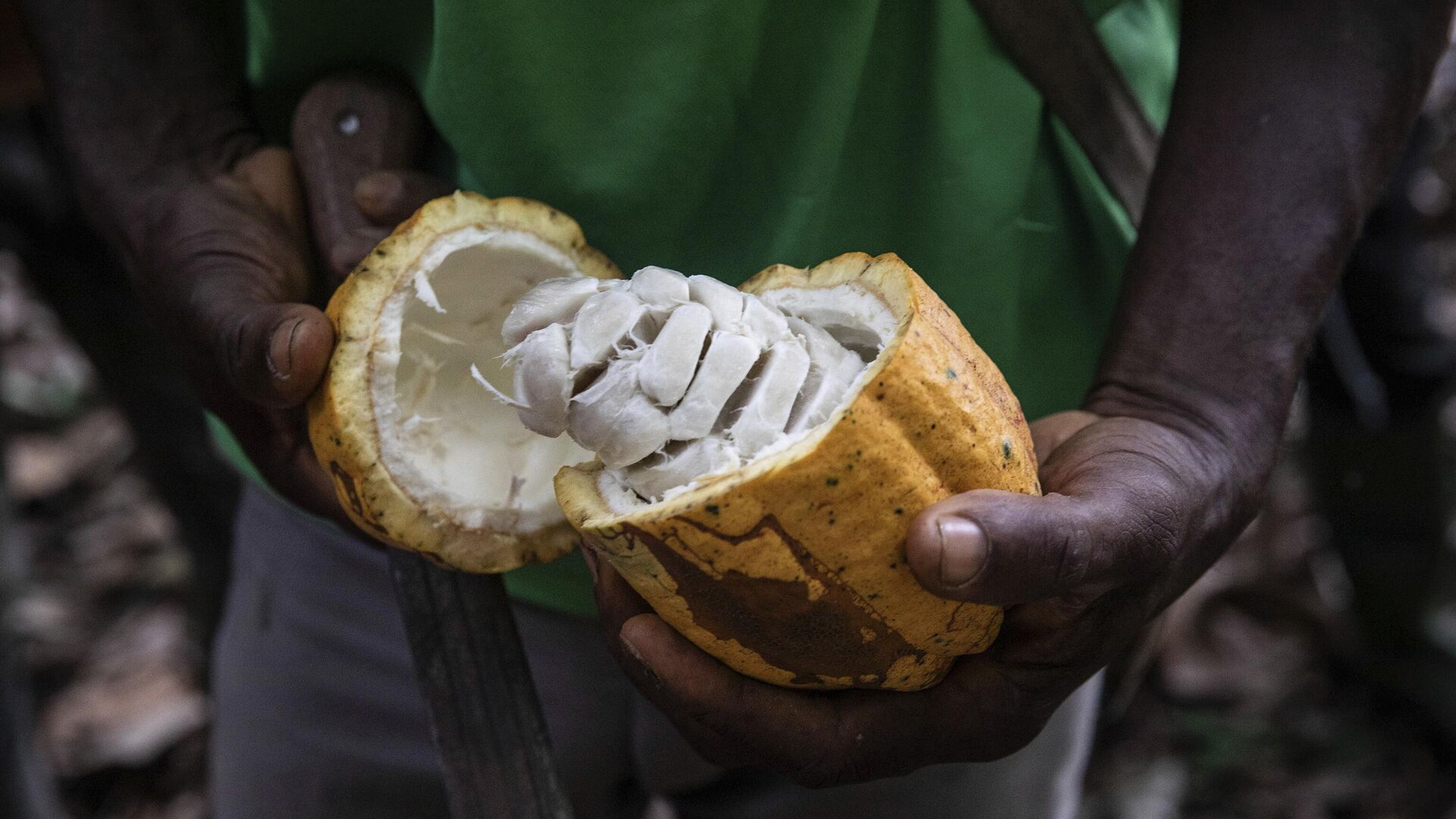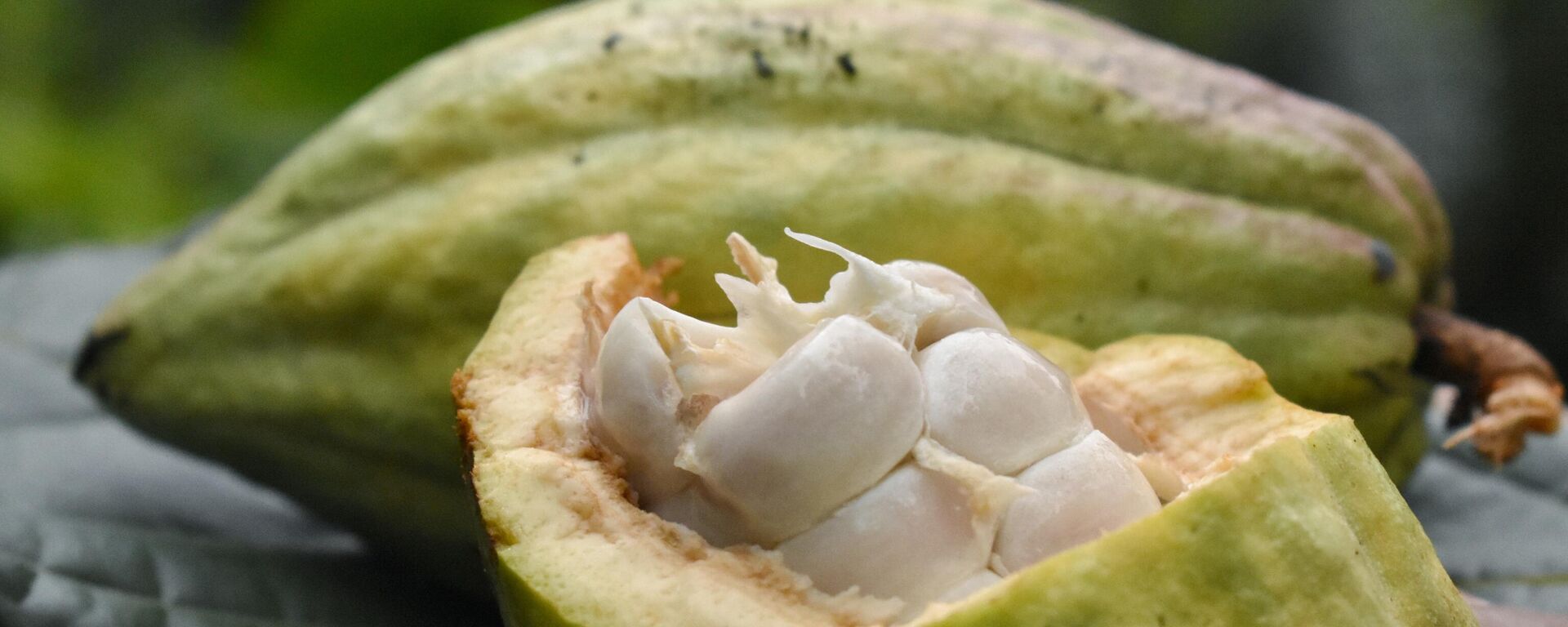https://en.sputniknews.africa/20240518/cote-divoire-cocoa-regulator-puts-halt-to-cooperatives-stockpiling-beans-for-sale-at-higher-prices-1066607780.html
Cote d'Ivoire Cocoa Regulator Puts Halt to Cooperatives Stockpiling Beans for Sale at Higher Prices
Cote d'Ivoire Cocoa Regulator Puts Halt to Cooperatives Stockpiling Beans for Sale at Higher Prices
Sputnik Africa
The global cocoa market is in turmoil as prices soar to unprecedented levels due to various issues affecting major producers in West Africa, particularly Cote... 18.05.2024, Sputnik Africa
2024-05-18T15:43+0200
2024-05-18T15:43+0200
2024-05-18T16:43+0200
sub-saharan africa
cote d'ivoire (ivory coast)
west africa
cocoa
economy
ghana
red sea
agriculture
crisis
prices
https://cdn1.img.sputniknews.africa/img/07e8/03/1c/1065811077_0:160:3072:1888_1920x0_80_0_0_ba283a9a413a151065b31ff989650201.jpg
The Coffee and Cocoa Council (CCC) of Cote d'Ivoire decided to temporarily halt the operations of about 40 cooperatives suspected of unlawfully stockpiling cocoa beans to sell them at higher prices to exporters facing difficulties in meeting their contract obligations, the Western media reported on Friday, citing two sources at the regulator.Due to cocoa disease and unfavorable weather, exporters have encountered a scarcity of beans and are now seeking ways to purchase beans to fulfill their contractual obligations. Some suppliers have allegedly taken advantage of this situation, the sources explained to the media.They also reported that suspended cooperatives and independent purchasers have accumulated over 60,000 tonnes of cocoa since the mid-crop began in early April.Exporters have reportedly expressed approval of the regulator's decision, stating that weekly deliveries of beans would be significantly higher than what they have been monitoring since the mid-crop period if beans were not being stockpiled.The purpose of the suspension, which was mandated for some cooperatives to halt trade last week and for others to do so this week, is to prevent overpayment by smaller exporters while competing with multinational cocoa buyers.From April to September, the farm gate price was 1,500 CFA francs ($2.50) per kg. However, certain cooperatives and other purchasers demanded that multinational corporations pay between 1,600 and 1,800 CFA francs at Cote d'Ivoire's ports of Abidjan and San Pedro, the media reported.Compared to the same period last year, cocoa arrivals at the ports of the world's leading producer of the main ingredient in chocolate have decreased by 29.3%.According to the two CCC sources, the regulator is conducting an inventory of supplies.For the first time since 1977, the price of one tonne of cocoa beans surpassed $5,000 in early February. By mid-March, prices had doubled since the end of last year, and by mid-April peaked at almost $11,500, according to ICE Futures data.The prices, however, significantly dropped in mid-May, reaching $7,166. This is still three times higher than in August 2022, though.The International Cocoa Organization projected in January that the two-year global cocoa bean shortfall will persist into 2024, while transportation issues in the Red Sea will contribute to the commodity's current upward trend.Cocoa prices have also risen due to low yields in West Africa, which produces around 70% of the world's cocoa. The El Nino weather phenomenon, characterized by above-average sea surface temperatures in the Pacific Ocean, led to higher temperatures and heavy rains in the region, resulting in low yields.
https://en.sputniknews.africa/20240502/world-cocoa-prices-fall-below-9000-per-tonne-for-first-time-since-late-march-1066341467.html
cote d'ivoire (ivory coast)
west africa
ghana
red sea
Sputnik Africa
feedback@sputniknews.com
+74956456601
MIA „Rossiya Segodnya“
2024
Christina Glazkova
https://cdn1.img.sputniknews.africa/img/07e7/0b/07/1063380906_0:0:673:674_100x100_80_0_0_79628b4d0cd9f29291a57aa13bbf9e7a.jpg
Christina Glazkova
https://cdn1.img.sputniknews.africa/img/07e7/0b/07/1063380906_0:0:673:674_100x100_80_0_0_79628b4d0cd9f29291a57aa13bbf9e7a.jpg
News
en_EN
Sputnik Africa
feedback@sputniknews.com
+74956456601
MIA „Rossiya Segodnya“
Sputnik Africa
feedback@sputniknews.com
+74956456601
MIA „Rossiya Segodnya“
Christina Glazkova
https://cdn1.img.sputniknews.africa/img/07e7/0b/07/1063380906_0:0:673:674_100x100_80_0_0_79628b4d0cd9f29291a57aa13bbf9e7a.jpg
cote d'ivoire (ivory coast), west africa, cocoa, economy, ghana, red sea, agriculture, crisis, prices, farmers, trade
cote d'ivoire (ivory coast), west africa, cocoa, economy, ghana, red sea, agriculture, crisis, prices, farmers, trade
Cote d'Ivoire Cocoa Regulator Puts Halt to Cooperatives Stockpiling Beans for Sale at Higher Prices
15:43 18.05.2024 (Updated: 16:43 18.05.2024) Christina Glazkova
Writer / Editor
The global cocoa market is in turmoil as prices soar to unprecedented levels due to various issues affecting major producers in West Africa, particularly Cote d'Ivoire and Ghana. Despite a decline in prices since the end of April, they remain high, reaching $7,348 per tonne on Friday.
The Coffee and Cocoa Council (CCC) of
Cote d'Ivoire decided to temporarily halt the operations of about 40 cooperatives suspected of unlawfully stockpiling cocoa beans to sell them at higher prices to exporters facing difficulties in meeting their contract obligations, the Western media reported on Friday, citing two sources at the regulator.
"We were forced to react vigorously and suspend around 40 cooperatives and buyers to put an end to this practice, which is destabilizing the domestic marketing system and putting some exporters in difficulty," one of the CCC sources was quoted as saying.
Due to cocoa disease and unfavorable weather, exporters have encountered a
scarcity of beans and are now seeking ways to purchase beans to fulfill their contractual obligations. Some suppliers have allegedly taken advantage of this situation, the sources explained to the media.
They also reported that suspended cooperatives and independent purchasers have accumulated over 60,000 tonnes of cocoa since the mid-crop began in early April.
Exporters have reportedly expressed approval of the regulator's decision, stating that weekly deliveries of beans would be significantly higher than what they have been monitoring since the mid-crop period if beans were not being stockpiled.
It's important to note, though, that hoarding beans itself doesn't constitute a crime, but stockpiling for the purpose of further sale at an inflated price does.
The purpose of the suspension, which was mandated for some cooperatives to halt trade last week and for others to do so this week, is to prevent overpayment by smaller exporters while competing with multinational cocoa buyers.
From April to September, the farm gate price was 1,500 CFA francs ($2.50) per kg. However, certain cooperatives and other purchasers demanded that multinational corporations pay between 1,600 and 1,800 CFA francs at Cote d'Ivoire's ports of Abidjan and San Pedro, the media reported.
Compared to the same period last year,
cocoa arrivals at the ports of the world's leading producer of the main ingredient in chocolate have decreased by
29.3%.According to the two CCC sources, the regulator is conducting an inventory of supplies.
"Cooperatives and buyers with delivery contracts will have to deliver quickly, otherwise we will direct them to other exporters ourselves," one of the sources at the cocoa regulator reportedly said.
For the first time since 1977, the price of one tonne of cocoa beans surpassed $5,000 in early February. By mid-March, prices had doubled since the end of last year, and by mid-April peaked at almost
$11,500, according to
ICE Futures data.The prices, however, significantly dropped in mid-May, reaching $7,166. This is still three times higher than in August 2022, though.
The International Cocoa Organization projected in January that the two-year global cocoa bean shortfall will persist into 2024, while transportation issues in the
Red Sea will contribute to the commodity's current upward trend.
Cocoa prices have also risen due to low yields in
West Africa, which produces around 70% of the world's cocoa. The El Nino weather phenomenon, characterized by above-average sea surface temperatures in the Pacific Ocean, led to higher temperatures and heavy rains in the region, resulting in low yields.



